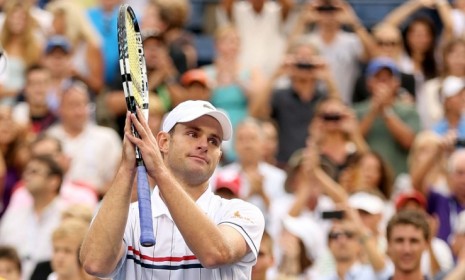Where did Andy Roddick's tennis career go wrong?
Bad timing? A fundamental lack of talent? As the 30-year-old American tennis player retires, critics weigh in on his frustratingly less-than-stellar career

A free daily email with the biggest news stories of the day – and the best features from TheWeek.com
You are now subscribed
Your newsletter sign-up was successful
Last week, 30-year-old tennis player Andy Roddick, once hailed as America's greatest hope in the sport, announced that the 2012 U.S. Open would be his last professional tournament. After his decisive loss to Juan Martin del Potro on Wednesday, Roddick stuck to his plan, bowing out of the sport with a brief speech that began, "For the first time in my career, I'm not sure what to say." Now, tennis commentators and fans are analyzing Roddick's career, which began with enormous promise but never reached the heights of those enjoyed by contemporaries like Swiss rival Roger Federer. Roddick won just one major, the 2003 U.S. Open, and repeatedly suffered demoralizing defeats at Wimbledon, the Olympics, and other tournaments. What went wrong?
Roddick was a victim of bad timing: Roddick's career is "marred by what could have been," says Jake Simpson at The Atlantic. Though Roddick "really did try everything" to challenge the dominance of Federer, the Swiss player always proved to be "a little (or a lot) better." In the end, Roddick's curse was timing; had he started his professional career five years earlier, "when Sampras and Agassi were fading and Federer was still a petulant teenager, he might have won two or three more Grand Slams, maybe even a Wimbledon." But against opponents like Federer, Rafael Nadal, and Novak Djokovic, he was always overmatched.
"Andy Roddick: Great player, bad timing"
The Week
Escape your echo chamber. Get the facts behind the news, plus analysis from multiple perspectives.

Sign up for The Week's Free Newsletters
From our morning news briefing to a weekly Good News Newsletter, get the best of The Week delivered directly to your inbox.
From our morning news briefing to a weekly Good News Newsletter, get the best of The Week delivered directly to your inbox.
Roddick just wasn't good enough: Roddick simply "could not duplicate the success" of American legends like Pete Sampras and Andre Agassi, says Jeff Briscoe at Yahoo! Sports. His all-around game was too limited to compete at the highest echelons, and despite the best efforts of a number of coaches, weaknesses like his backhand "never seemed properly nurtured." Though his "harsh defeat" at the hands of del Potro denied Roddick a "fairytale finish" to his career, he also selected the "proper time to exit" at age 30: Roddick's "status and ability would have soon declined rapidly" if he'd continued to play.
"Tennis career of Andy Roddick ends at U.S. Open: Fan's retrospective"
Roddick deserves more credit than he's received: Roddick has been criticized — and will continue to be criticized — "for his failure to continue the run of American dominance in men's tennis," but he also deserves "the praise, the standing ovations, and every defense of his career," says Louisa Thomas at Grantland. His run will be defined more by his defeats than his victories, but even when Roddick lost, "his hustle," "his drive," and "his indomitability" made him an exciting and important player, even as he routinely disappointed American fans. Though he couldn't quite keep up in the Federer era, "the sport will still miss Roddick."
A free daily email with the biggest news stories of the day – and the best features from TheWeek.com